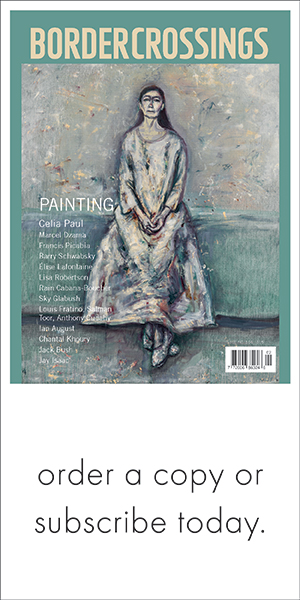Among the thousands of pieces on display at the Grand Palais as part of the 1961 Salon des Indépendants hung an oil painting by Madeleine Luka. In Les KK, an expressive Nikita Khrushchev sits in an inviting chair, sporting a green army shirt but no shoes (presumably because he had forgotten to put them back on at the United Nations the year before). Wearing a blue suit, a brown tie, and a pair of oxfords, a jovial John F. Kennedy sits across from the Soviet premier. The two world leaders are playing a game of chess and having a good time at it; the American president looks as if he’s about to give his opponent a thumbs-up. A perplexed cherub watches from above. “The over-all effect of the work on viewers was more of general amusement than of partisanship or offense,” the New York Times reported from Paris. “Most comments centered on the fact that in view of the Cuban situation, the artist had struck even a more timely note than she had intended.”
Whether intentionally or not, Luka was participating in a long tradition of using chess as a geopolitical metaphor. Nearly 300 years before the artist finished her satirical scene, the first Earl of Clarendon wrote in The History of the Rebellion and Civil Wars in England, “I have often observ’d, that a desperate game at Chess has been recover’d after the loss of the Nobility, only by playing the pawns well.” Much later, around the turn of the twentieth century, the British scholar Frederick Edward Gretton described Hannibal’s “famous game of chess with Fabius.” Figurative uses of the classic pastime would only multiply in the decades that followed the French art exhibition, as the Cold War dragged on and on.
After that conflict finally ended, the McGill graduate and former United States national security adviser Zbigniew Brzezinski published The Grand Chessboard. “Eurasia is thus the chessboard on which the struggle for global primacy continues to be played,” he wrote. “As in chess, American global planners must think several moves ahead, anticipating possible countermoves.” By the time Vladimir Putin was countering the U.S. and its NATO allies with 100,000 pawns along the border of Ukraine in early 2022, the usage had worn thin. “It’s easy to see why the chess match metaphor is never far away,” Foreign Policy noted. Yet the cliché of the Russian president “as a master chess player” is “tired.” The Atlantic agreed: “Putin’s No Chess Master.”
Whatever his competencies, Putin has continued to play by his own rules, destroying countless lives in his invasion of Ukraine and threatening to station tactical nuclear weapons in neighbouring Belarus. The reverberations of his war have been many: soaring energy prices, global food shortages, and a European economy projected to grow just 0.8 percent in 2023, according to the OECD. There have also been surprises, including Volodymyr Zelensky’s dignified example and Ukraine’s resilience on the battlefield. It all brings to mind an entirely different metaphor, one derived from a quintessentially Canadian activity: geopolitics as curling.
Chess and mathematics are intimately related, which is one of the reasons computers are such good players. The roaring game is different. While it certainly involves strategy and physics, any number of intangibles affect the outcome of a throw, of an end, of a round robin. For that reason, there’s a marked humility on the ice and in the press box, a recognition that the pebble, the set of rocks, the atmospheric conditions, even the size of the crowd on any given day can confound the savviest of curlers.
Perhaps it’s the chaotic state of things that led me to pay more attention than usual to the recent World Curling Championships — the women’s tournament in Sandviken, Sweden, and the men’s in Ottawa. Kerri Einarson and Brad Gushue may be among the best skips around, but we never know how their granite pancakes will interact with those of their competitors. Nor do we know how moves will play out when it comes to the many games that constitute modern global affairs. Consider the new guard NATO has placed with its latest member, Finland. Will Putin blast it or try to come around another way? What’s the take-out weight required to remove Chinese interference from our electoral house? Will Washington be able to draw Canadian forces into Haiti, and how many ends would we have to play once there? This is all much more complicated than cornering a king.
Now largely forgotten, Madeleine Luka died in 1989. Still, she came to mind as our Canadian curlers took on the world. How might this “eccentric but often charmingly quaint” painter, as The American Magazine of Art once described her, have depicted today’s geopolitical mess? Perhaps, like me, she’d ditch that old imagery and opt for an allegorical bonspiel of the most profound consequence.
Kyle Wyatt is the editor-in-chief of the Literary Review of Canada.

